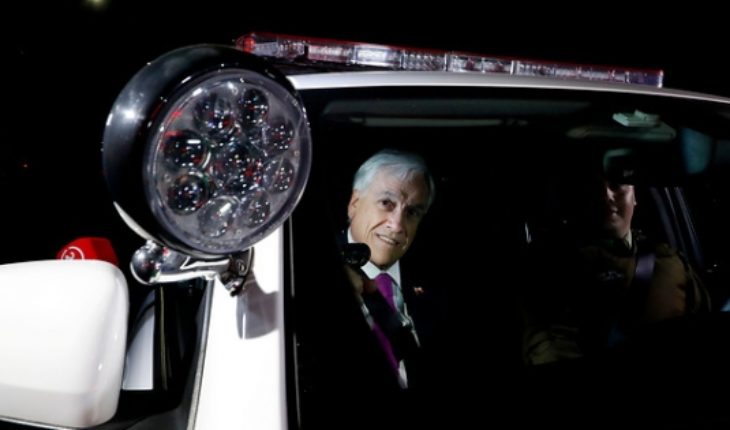The announcement of President Sebastián Piñera promote a draft law to strengthen preventive control of identity, as part of its prioritisation of the security for this second year of Government, it has already generated reactions in opposition and it has also raised questions from experts.
The idea was defended the weekend by the Minister of the Interior, Andrés Chadwick, who said this initiative seeking to upgrade “both in the accuracy of cases of evidence that allow the control and cases that permitted the simple registration of persons controlled”. This morning, spokeswoman for Government, Cecilia Pérez, Minister also defended the presentation of this project, arguing that the current law should “have modifications that allow, not only and eventually expand the age so that people can be the control of identity, we are talking about eventually adults aged 14, but also allow the registration without indication, and here are talking about accessories, automobiles, clothing. It is super clear, whom nothing makes, afraid of nothing”.
From 2016 is effective current laws, whose debate occurred during the second Government of Michelle Bachelet and that gave powers to Carabineros and the investigations police (PDI) to “verify the identity of anyone over 18 “years on public roads and other public places in areas deprived of access to the public, by any means of identification”.
Precisely what seeks Sebastián Piñera administration is reforming the law, granting greater powers to the police, and on which there are two ideas on the table. According to what you said Minister Chadwick to La Tercera, is intended to expand the powers to check backpacks and jackets. Not only that, also will be sought include teens in this control mechanism.
The rejection of the opposition in the political world, the announcement by the Government has generated divided views. From the UDI and national renewal (RN) they valued the initiative. In fact, trade Senator Juan Antonio Coloma, said that they will ask immediate discussion when you enter the project.
A very different view is that holding the parliamentary opposition. The President of the Socialist Party (PS), Álvaro Elizalde, accused “improvisation” by the Government. “I hope to be a communication strategy that does not solve the underlying problem,” lashed out.
Meanwhile, Senator Felipe Harboe (PPD) said that “they are not conditions” to give powers to the police. “Gone are the blank cheques. This is an instrument that was already delivered to the police and thus and all today celebrates one year of Government, the Government in the field of crime has nothing to celebrate, because we have an increase in the level of violence of the crimes in the country” He added.
Critical opinion of experts among the specialists there are also criticisms. For the director of the laboratory of security and ex-National Chief of public security of the Ministry of the Interior during the Government of Michelle Bachelet, Eduardo Vergara, these measures “will generate more violence, will increase distrust in police and reduce rights and freedoms”.
“The Government is installing a police state in which recognize that they will remove us freedoms at the expense of articulating his populism of heavy-handed and control. Deliver even greater powers to the police violating degree of presumption of innocence. “Already the 2018 were 560,000 preventive identity checks only in rounds, with a modest 6.5% efficiency”, he added.
According to Vergara, which aims to Pinera’s Government is a “police state style great brother.” Down civil liberties, expanding to control and mass rounds, will continue to disproportionately punishing the most vulnerable and disadvantaged communes subsidiarán the security of more, as we have already demonstrated in studies criminal in communes the metropolitan region”.
Along the same lines, the scholar of the University Diego Portales (UDP), Mauricio Duce, told La Tercera that “is worrying what is proposing the Government because so far the empirical background realize that preventive control is much less effective investigative control”.
Duce also pointed out that it did not “what is the evaluation of the Government (on the Bill), I have not ever seen, not published disaggregated data, I do not know any assessment indicating that we should extend this type of tools”.
“The announcement may be inspired more by a communication issue than a real need for the criminal justice system,” he added.
On the other hand, the former director of Sename during Pinera’s first Government, Francisco Estrada, said that “there is no study that serves as background and to provide evidence favorable to propose a revision upward of the system”.
The lawyer also rejected the possibility of including teenagers within the rules: “It is very harmful, generates a series of frictions with the police, which leads to false arrests and police abuse”.
Other experts rejected this new initiative from the Government was Luis Vial, who served as head of the Undersecretariat of crime prevention studies in the second period of Michelle Bachelet. “Is not yet clear that the previous project has had some effect, it is not clear that it is a way to prevent crime,” he said.
In this context, to Vergara, the announcement of the Government “forces the opposition to take a step forward. Without counterweight we end a 2019 with more violence, a police force with less credibility, greater social conflict and less respect for individual rights”.
Moreover, he added that the current preventive control of identity ‘is already at the limit”, so”hand over powers to a police questioned following is a tremendous unreasonableness and generate still greater distrust towards police with greater social conflict”.
translated from Spanish: Wave of criticism of project for preventive control of identity: accused “blank check” and “communication strategy”
March 11, 2019 |





![translated from Spanish: [VIDEO] NASA canceled SpaceX rocket launch that would carry two astronauts translated from Spanish: [VIDEO] NASA canceled SpaceX rocket launch that would carry two astronauts](https://ananoticias.com/wp-content/uploads/2020/05/translated-from-Spanish-VIDEO-NASA-canceled-SpaceX-rocket-launch-that-370x215.jpg)